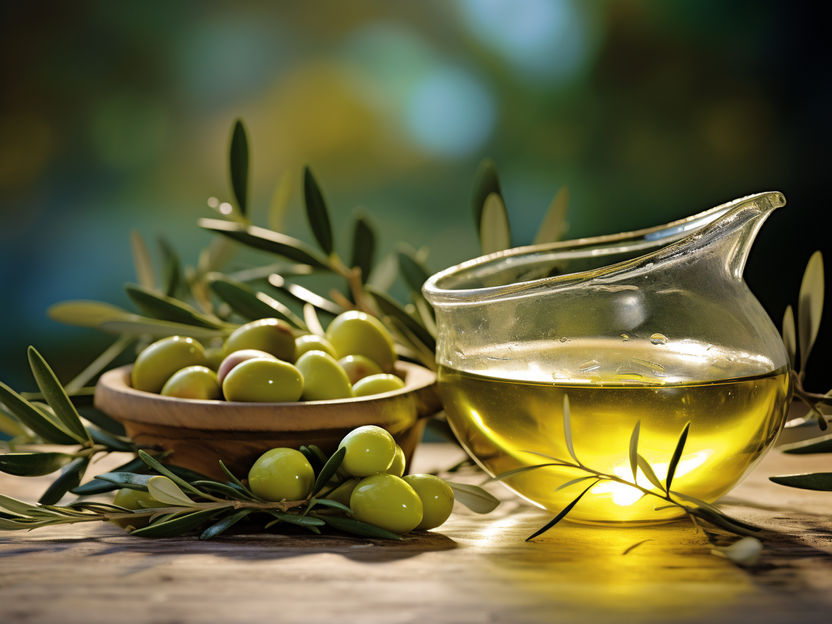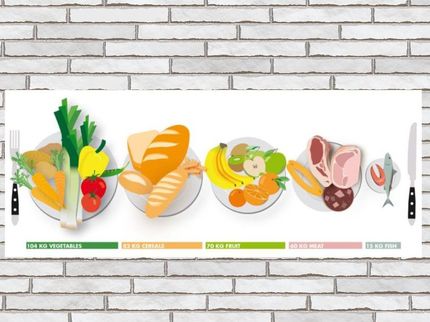Germany under the spell of olive oil fever
Growing enthusiasm for the liquid gold from Spain
Advertisement
olive oil consumption per inhabitant in Germany is currently around 1 liter. This is significantly lower than consumption in Mediterranean countries such as Spain with 11.4 liters, Greece with 10.3 liters and Italy with 7.1 liters. However, it is important to emphasize that consumption in Germany, although still low, has already exceeded the one kilo per inhabitant per year mark, indicating a continuous growth in sales in the coming years.

Symbol image
computer generated picture
Germany has already tripled its consumption of olive oil during this century, reaching about 80,000 tons in 2022, consolidating its position as the largest European consumer of olive oil among non-Mediterranean countries. Spain is the producer that has benefited most from this market growth. In 2013, 13.52 percent of the olive oil consumed in Germany came from Spain; a decade later, this percentage is 31.65 percent and nearly 25,000 tons.
In fact, consumption has already exceeded the psychological threshold of one kilo per inhabitant per year, indicating that olive oil is gradually taking an important place in German gastronomy. German consumers are increasingly open to exploring new culinary options and healthier eating habits. Above all, this phenomenon shows that German consumers are increasingly aware of the health benefits of "liquid gold." This is not surprising, as they are concerned about their health and therefore prefer natural and high-quality foods such as Extra Virgin Olive Oil from Spain.
Nutrition experts, such as Spanish researcher Rosa Mª Lamuela-Raventós of the University of Barcelona and CIBEROBN, are aware of the central role that these healthy fats play in a balanced diet. "It has been shown that those who use them in their cooking have a more balanced diet. By using this food, they are more inclined to include vegetables and fish in their meals, which brings them in line with healthy eating patterns." In addition, they benefit from the unique properties of this food: "Among the outstanding benefits is the high content of oleic acid, which has a positive effect on lowering LDL cholesterol, commonly known as 'bad cholesterol,' and on cardiovascular protection. In addition, EVOO is a significant source of antioxidants, such as polyphenols. In fact, EFSA supports this health claim. In addition, its consumption has been found to be associated with the prevention of chronic diseases."
However, the researcher points out that in markets like Germany, where consumption of extra virgin olive oil began relatively recently, consumers tend to limit it to raw preparation. This is a mistake, he said, as Extra Virgin Olive Oil offers health benefits in both hot and cold use. While it is known for use in raw dressings and sauces, it is also suitable for medium and low heat cooking. Its health properties, such as its resistance to high temperatures and its ability to maintain the stability of monounsaturated fatty acids, make it suitable for frying, grilling and deep-frying. In fact, the doctor has conducted research that has shown that "at a temperature of 120ºC, despite the drop in the content of polyphenols (natural antioxidants) in the oil during cooking, the levels are still high enough to consider the product 'healthy' according to EU regulations," which means that it has properties that can protect against the oxidation of LDL (bad) cholesterol," she says.
In fact, Rosa María considers sofrito, a typical staple in the Spanish diet, a great healthy secret: "When prepared with fresh ingredients such as tomatoes, onions, garlic and, of course, Extra Virgin Olive Oil, it becomes a source of antioxidants, carotenoids and polyphenols, and monounsaturated fatty acids. The combination of these ingredients and their preparation at low heat allows to preserve the healthy properties of the oil and vegetables. Sofrito is used in many traditional Spanish recipes and is an example of how delicious and nutritious dishes can be prepared from fresh and healthy ingredients.
About Olive Oils from Spain in Germany
The Interprofessional Association of Spanish Olive Oil is a non-profit society that, born from the initiative of the sector (olive growers, cooperatives, industry, packers and exporters), unites all the links in the production and marketing chain of the Spanish olive oil sector. Germany is a key market for olive oils from Spain. For this reason, a new campaign has been launched to promote this product on the German market and raise awareness of its diversity and benefits. This campaign is based on one of the most important differentiators of olive oil: its quality. According to World's Best Olive Oils, extra virgin olive oils from Spain are the most awarded olive oils in the world. In the context of PR events the federation addresses in addition professionals from the catering trade and specialized dealers as well as over 16 sample conditions in points of sale such as AEZ, EDEKA and center sea. Olive oil from Spain has already been present in Germany since 2021 thanks to the "Olive Oil World Tour" campaign co-financed by the European Union. The aim of the initiative is to get in touch with German consumers who are interested in Mediterranean gastronomy and a healthy lifestyle. After all, Spanish olive oil is one of those vegetable products that contribute to increasing biodiversity and meet all the requirements to be considered an environmentally friendly product that contributes to sustainable agriculture.
Note: This article has been translated using a computer system without human intervention. LUMITOS offers these automatic translations to present a wider range of current news. Since this article has been translated with automatic translation, it is possible that it contains errors in vocabulary, syntax or grammar. The original article in German can be found here.


























































